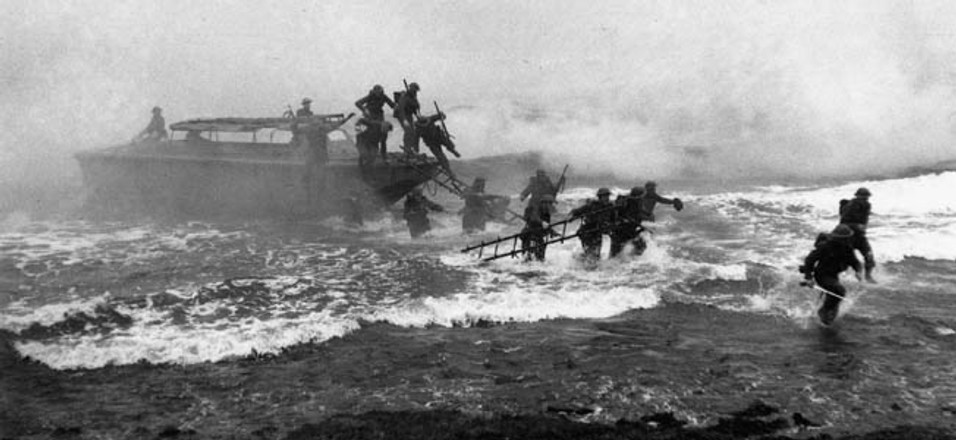Mad Jack - A 20th Century Warrior with a Longbow and a Sword
Posted by Dave Cottrell on Jan 25th 2018
Mad Jack was the name given to the very colorful British army officer, Lieutenant-Colonel John Malcolm Thorpe Fleming Churchill (who was no relation to British Prime Minister Winston Churchill).
Also known as "Fighting Jack Churchill," he was famed for fighting throughout World War Two armed with a longbow, a Scottish broadsword called a basket-hilted sword, and bagpipes!
You would think a man so armed would have died young, but that is not the case with Mad Jack. He was born in 1906 in Hong Kong, and died in 1996 in the UK. That's 90 years!
Mad Jack loved a fight, but was far from being a "normal" soldier. In World War II, he captured 42 German soldiers, armed only with a sword, killed a Nazi with an arrow fired from his longbow, and made an epic escape from a Nazi concentration camp. British historians describe him as one of the world's greatest adventurers.
It is said that Fighting Jack Churchill never went into battle without his basket-hilted sword. He famously said, "In my opinion, any officer who goes into action without his sword is improperly dressed."
Before each battle, Churchill would play his bagpipes, which he had learned to play very well in Maymyo under the pipe major of the Cameron Highlanders. He continued to study the bagpipes when he returned to the UK, placing second in the piping championships in Aldershot, an astonishing accomplishment for an Englishman!
In one battle, when his battalion was overrun by the enemy and they were out of ammunition, he sat down and began to play the bagpipes until he was captured by the Germans. They put him in Sachsenhausen concentration camp in Oranienburg, Germany, about 25 miles north of Berlin.
He and an RAF officer escaped by crawling under the wire and through an abandoned drain, planning to walk to the Baltic Sea. Instead, they were captured near Rostock, only a few miles from the coast and placed in a camp at Niederdorf, Austria.
Never one to give up, Mad Jack watched for an opportunity, and when it came, he walked away in April, 1945, when the lighting system in the camp failed. He walked away from a work detail in the dark, heading for the Alps and the Italian frontier. He survived on vegetables pillaged from Austrian gardens, which he cooked in a tin can he had smuggled from the camp in his pocket.
He stayed off the roads, crossing the Brenner Pass into Italy, aiming for Verona, a distance of about 150 miles. As luck would have it, he sprained his ankle crossing the rough terrain, but on the eighth day of his escape he spotted a column of armored vehicles bearing the unmistakable white star of the US Army. He was able to convince them he was a British colonel, and was finally in friendly hands. For him, this would be the end of the war.
After he returned to England, he headed for Burma to fight the Japanese, but by the time he arrived in India, the war was over. The atomic bombs had been dropped on Hiroshima and Nagasaki, and the Japanese had capitulated.
Though the world war was over, Mad Jack's career as a fighting soldier was not. After training as a paratrooper with the Seaforth Highlanders, he was sent to Palestine as second-in-command of 1st Battalion, the Highland Light Infantry.
In 1948, just as the British Mandate was ending, he was once again in the thick of it, when a Jewish medical convoy was ambushed by Arabs in Jerusalem. In full dress uniform, having just come from a battalion parade, he walked down the street toward the battle, "grinning like mad from side to side," as he later said. While the Arabs did not shoot him, the convoy foolishly turned down his offer of help, expecting their own forces to save them. Jack and his small band of twelve men fought the attackers with small arms fire, but eventually the convoy was wiped out by Arab gasoline bombs and rifle fire.
While he was not successful in saving that convoy, he later engineered the rescue of some 700 patients, staff and students from the university and hospital on Mount Scopus in Jerusalem.
Over the course of his career, Mad Jack earned two Military Crosses, Distinguished Service Order with bar, the 1939-45 Star, Italy Star, Burma Star and War Medal 1939-1945.
While training in Scotland to become a commando, Churchill met Rosamund Denny, the daughter of a Scottish ship building baronet. In the spring of 1941, they were married in Dumbarton, Scotland. Their happy marriage lasted 55 years, till his death in 1996, and produced two children.
A few lesser known facts about Mad Jack are that he worked for a while on the editorial staff of a Nairobi newspaper, was a model for magazine ads, and was a movie extra. In fact, he played the bagpipes in the 1938 movie, The Drum, a war movie directed by Zoltan Korda. He also competed for Britain in the archery world championships in Oslo in 1939.
Mad Jack Churchill was a true warrior and war hero, yet after 89 years of life and adventure, he died peacefully in his own home in the spring of 1996. He did not love war in his life, but he did love excitement and challenges. His fearless and flamboyant style in the face of danger have earned him a place in the history books as one of the rarest of men and a true hero.


